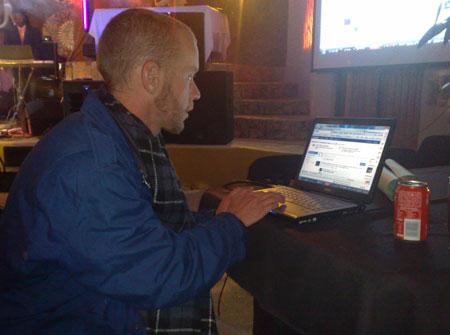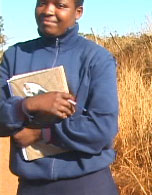The Highest HIV Rate in the World: Beyond Statistics #2

BarCamp Swaziland had just ended, and now it was time for the annual Facebook Party at the “Afro-Shakepearean” amphitheatre-like venue called House on Fire. The house was on fire, orange lights flickering on the walls, and house music pounding through giant speakers. DJ’s spun records, and the dancing was beginning. Most party guests had found out about the party on the Swazis Rock Facebook page. The dress code was described as “elegant warm”, and the young women in faux fur zippered vests and men in track suits fit the hip-hop style.
The upstairs sections were reserved for VIP’s, and that meant royals. I snuck up the stairs with my video camera hoping to get a shot of the party from above, and a well-dressed young prince rudely cornered me and asked where I was from. “Los Angeles,” I answered, and he told me this was a VIP section and I wasn’t allowed to film there.
I went back downstairs.

The multi-talented IT director from Malandala’s Homestay, Mark Fulton, sat in his most comfortable position, hunched over a laptop, projecting tweets and photos from the day’s barcamp onto the wall. Mark had grown up in Zimbabwe, and had studied hotel and restaurant management, and emigrated to Swaziland after pseudo-war veterans had taken over and pillaged many a formerly thriving restaurant. So he made a living in Swaziland using his IT skills, and was a computer gaming fanatic, playing with a tight-knit community of local gamers. He showed off World of Warcraft to the rural kids at the conference, and for many that was their favorite part.
The dance floor was packed with healthy-looking, well-built and well-dressed young people who were cosmopolitan and sophisticated compared to the rural youth, living without parents, who had come to help with BarCamp Swaziland. We could have been at a nightclub in San Francisco or London or Los Angeles. A Peace Corps volunteer went to ask the DJ’s to play some Michael Jackson, since he had just died the day before, and they refused, in favor of continuing the house beat.
“Could it really be true?” I asked an American friend who had lived in Swaziland for a couple of years. “That a third of the people in this room are HIV positive?”
“Oh, probably more than that, ” she answered, “since the prevalence is higher in their age group. Probably nearly half the people in this room are HIV positive.”
The music pounds around me. It is too loud for talking and reflecting. Couples are pressing close on the dance floor, swaying to the pounding bass. There is nothing left to do but join the dancing, the blacks and browns and coloureds and whites shimmying, blending in great big flashes of orange light — the orange glow making us all look like something is burning inside our skins, like we are indeed on fire. Positive. Negative. Positive. Negative. The combination of luck and chance and preparation and status and will that determines our outcomes. Suddenly in a flash of light, I see on the dance floor a small unopened condom package that has slipped out of someone’s pocket. And we keep dancing, and dancing, and dancing, until the morning.












 Phindile, a smiling, broad-faced young woman with close-cropped hair, is the oldest one on her rural homestead and helps to care for her siblings. Her parents have both died. An older brother works in the city and sends money “sometimes.” As an advisor to YouthAssets.org, Phindile helps to counsel other orphans who head households. Largely due to the AIDS epidemic, there are over 15,000 orphan-headed households in the small kingdom of Swaziland, about 10% of families.
Phindile, a smiling, broad-faced young woman with close-cropped hair, is the oldest one on her rural homestead and helps to care for her siblings. Her parents have both died. An older brother works in the city and sends money “sometimes.” As an advisor to YouthAssets.org, Phindile helps to counsel other orphans who head households. Largely due to the AIDS epidemic, there are over 15,000 orphan-headed households in the small kingdom of Swaziland, about 10% of families.